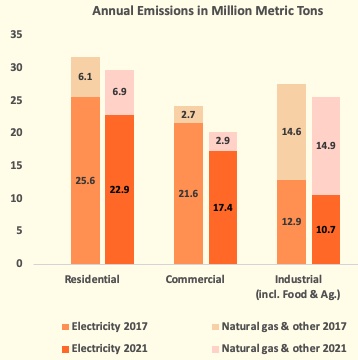January 4rd, 2024 Buildings & Materials Seminar
You can view our PowerPoint outlining our buildings and materials solutions in the link attached here

OVER THE PAST FIVE YEARS: Electricity emissions from homes, businesses and industry have declined, while natural gas emissions have risen
Homes
Overall emissions from the consumption of energy in housing declined by 6.0% between 2017 and 2021. However, emissions from non-electric fuels including natural gas and propane increased by nearly 12%, from 6.1 to 6.9 MMtCO2-e between 2017 and 2021. As of 2021, almost half of households in Georgia still use natural gas for heating, increasing the sector's emissions.
Businesses
Businesses and commercial buildings mostly rely on electricity for heating, cooling and other energy uses, and as a result they have seen a large (16.5%) decline of nearly 4 MMtCO2-e of GHG emissions between 2017 and 2021. The commercial sector is a relatively small but growing consumer of natural gas in Georgia, which produced a 6.9% increase in its non-electric GHG emissions over the same 5 years.
Industry
Georgia's greenhouse gas emissions from industry decreased by 2%, principally as a result of its consumption of less carbon-intensive electricity. More than half of industry's GHG emissions are produced on site, principally from the combustion of natural gas or its use as a feedstock in manufacturing. These emissions from sources other than electricity increased by about 2% over the past 5 years.
Recycling/Waste Management
 A report from the Georgia Dept. of Community Affairs found Georgians throw away 1.9M tons of paper, 1M tons of plastics, 0.36M tons of metal, and 0.24M tons of glass annually.
A report from the Georgia Dept. of Community Affairs found Georgians throw away 1.9M tons of paper, 1M tons of plastics, 0.36M tons of metal, and 0.24M tons of glass annually.
Many cities in Georgia, including Atlanta, have active recycling programs. Stanford University estimates that one ton of recycled plastic saves about 5,800 kWh of energy.
Carbon Drawdown Potential: 1 Megaton of reduction = Recycle at least 20% of current paper waste
Refrigerant Management
 Hydrofluorocarbons (HFCs) – a class of refrigerant chemical – have an extremely high global warming potential, with thousands of times the heat trapping potential of CO2.
Hydrofluorocarbons (HFCs) – a class of refrigerant chemical – have an extremely high global warming potential, with thousands of times the heat trapping potential of CO2.
In December 2020, Congress passed legislation to phase down HFCs nationwide by 40% by 2024 and by 85% by 2036. The phase down will be administered by the U.S. EPA.
Carbon drawdown potential: 1 Megaton of reduction = Retrofit refrigeration systems in all Georgia grocery stores to refrigerant leakage rate of 8%
Retrofitting
 Retrofitting existing buildings can reduce energy demand and lower their associated greenhouse gas emissions.
Retrofitting existing buildings can reduce energy demand and lower their associated greenhouse gas emissions.
Retrofitting includes improving insulation, installing LED lighting, replacing conventional HVAC systems with high efficiency heat pumps, and installing high-efficiency windows.
Carbon Drawdown Potential: 1 Megaton of reduction = Retrofit 20% of Georgia’s homes to save 20% of energy

